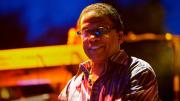World-renowned jazz musician and composer Herbie Hancock will be the University’s 2014 Norton Professor of Poetry, giving six lectures this spring on topics that include “The Wisdom of Miles Davis,” “Breaking the Rules,” “Cultural Diplomacy and the Voice Of Freedom,” and “Innovation and New Technologies.”
“It is a great privilege to welcome Herbie Hancock as the Norton Professor,” said Homi Bhabha, Rothenberg professor of the humanities and director of the Mahindra Humanities Center, which is hosting the lectures. “His unsurpassed contribution to the history of music has revolutionized our understanding of the ways in which the arts transform our civic consciousness and our spiritual aspirations. It would be no exaggeration to say that he has defined cultural innovation in each decade of the last half-century.”
Born on April 12, 1940, in Chicago, Hancock grew up in a family that wasn't particularly musical, according to Biography.com. At the age of seven he began studying European classical music, which continues to influence both his playing and composing. At the same time, he was influenced by jazz pianists like George Shearing, Oscar Peterson, and Erroll Garner. As a young teenager, he was playing Mozart with the Chicago Symphony Orchestra. As a member of the Miles Davis Quintet (which he joined in 1963), Hancock performed on dozens of albums and established a reputation as an outstanding composer who explored genres outside traditional jazz, ranging from fusion to R&B to hip-hop.
Hancock has also provided scores for a number of TV and film projects, including Bill Cosby's Fat Albert cartoon series and an accompanying album, as well as for the movies Death Wish (1974), A Soldier's Story (1984), and Jo Jo Dancer, Your Life Is Calling (1986). He won an Academy Award for the score to 'Round Midnight (1986); his other honors include 14 Grammy Awards, including Album Of The Year for River: The Joni Letters.
Hancock currently serves as Creative Chair for Jazz for the Los Angeles Philharmonic Association and as Institute Chairman of the Thelonious Monk Institute of Jazz. He is a founder of the International Committee of Artists for Peace (ICAP), and was recently awarded the title of Commandeur de l’Ordre des Arts et des Lettres by French prime minister François Fillon. In 2011, Hancock was named a UNESCO Goodwill Ambassador by UNESCO Director-General Irina Bokova.
“I think I will always be involved with youth-oriented music because I haven't forgotten that I was young once,” Hancock once told NPR. “The seeds of youth will stay alive as long as you don't kill them.”
The 2014 Norton Lectures will be delivered in Sanders Theatre on Monday, February 3; Wednesday, February 12; Thursday, February 27; Monday, March 10; Monday, March 24; and Monday, March 31. Lectures begin at 4 p.m. and are free and open to the public, although tickets are required.









